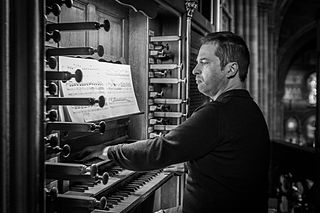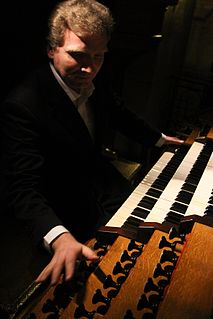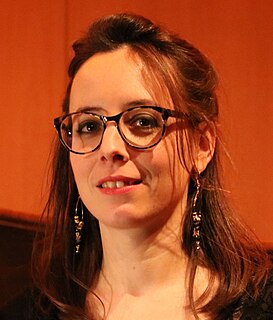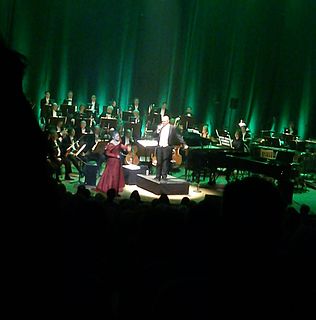

Francis Jacob (born 4 July 1972) is a French organist and harpsichordist.


Francis Jacob (born 4 July 1972) is a French organist and harpsichordist.
Born in Saverne, Jacob started playing the organ at a young age. He was only thirteen when he replaced the organist from Saessolsheim, who had fallen ill. [1] He studied the organ with Sylvain Ciaravolo and André Stricker in Strasbourg and with Jean Boyer in Lyon. He studied the harpsichord with Aline Zylberajch in Strasbourg and with Jan-Willem Jansen in Toulouse, as well as basso continuo with Martin Gester in Strasbourg and with Jesper Christensen in Basel.
Jacob has taught organ and harpsichord at the Conservatoire de Perpignan, the Conservatoire de Toulouse and the Conservatoire de Montauban. Since 2001 he has been an organ and basso continuo teacher at the Conservatoire de Strasbourg.
He performs as soloist on organ and harpsichord, and in the chamber and orchestral music, particularly with the Ricercar Consort, the Concert Royal, Gli Angeli, and other ensembles.
He is very interested in organ building, which he practises with Bernard Aubertin in Courtefontaine.
He is still the organist of Saessolsheim, where he succeeded, with the help of the Saessolsheim Organ Friends’ Association, in enriching the church with a new Aubertin organ, which energised the cultural life of the village. [2]
All CDs in this section were recorded on Aubertin organs.
He has recorded CDs with Le Parlement de Musique and the Ricercar Consort, among others. On some of the first ten CDs mentioned below, which he recorded with the Ricercar Consort under the direction of Philippe Pierlot, he also plays works by J.S. Bach as organ soloist.

The Chronicle of Anna Magdalena Bach is a 1968 film by the French filmmaking duo of Jean-Marie Straub and Danièle Huillet. It was their first full-length feature film, and reportedly took a decade to finance. The film stars renowned harpsichordist Gustav Leonhardt as Johann Sebastian Bach and Christiane Lang as Anna Magdalena Bach. The orchestral music was performed by Concentus Musicus and conducted by Nikolaus Harnoncourt. It is the first of several Straub-Huillet films to be based on works of classical music. The film was entered into the 18th Berlin International Film Festival.

Johann Sebastian Bach was a German composer and musician of the late Baroque period. He is known for his orchestral music such as the Brandenburg Concertos; instrumental compositions such as the Cello Suites; keyboard works such as the Goldberg Variations and The Well-Tempered Clavier; organ works such as the Schubler Chorales and the Toccata and Fugue in D minor; and vocal music such as the St Matthew Passion and the Mass in B minor. Since the 19th-century Bach revival he has been generally regarded as one of the greatest composers in the history of Western music.
Lionel Rogg is a Swiss organist, composer and teacher of musical theory. He is best known for performing the music of Johann Sebastian Bach, whose complete organ works he has recorded three times.
Louis Henry Nicolas Thiry was a French concert organist, composer and pedagogue. He was professor of organ at the Regional Conservatoire in Rouen and played in concerts internationally. His many recordings include the complete organ works of Olivier Messiaen in 1972, which received several awards and led the composer to describe him as "an extraordinary organist". Thiry was blind.

The Ricercar Consort is a Belgian instrumental ensemble founded in 1980 together with the Ricercar record label of Jérôme Lejeune.

Johann Vexo is a French organist. He is the organist for both the choir organ at Notre Dame de Paris and the great organ of Nancy Cathedral.

The organ concertos of Johann Sebastian Bach are solo works for organ, transcribed and reworked from instrumental concertos originally composed by Antonio Vivaldi and the musically talented Prince Johann Ernst of Saxe-Weimar. While there is no doubt about the authenticity of BWV 592–596, the sixth concerto BWV 597 is now probably considered to be spurious. Composed during Bach's second period at the court in Weimar (1708–1717), the concertos can be dated more precisely to 1713–1714.

Vincent Warnier is a contemporary French classical organist.
The Harpsichord Concerto in D minor, BWV 1052, is a concerto for harpsichord and Baroque string orchestra by Johann Sebastian Bach. In three movements, marked Allegro, Adagio and Allegro, it is the first of Bach's harpsichord concertos, BWV 1052–1065.

Éric Maurice Lebrun is a French composer, organist, musicologist, and author.
Aline Zylberajch is a French harpsichordist, teacher and musicologist, also playing the organ and the piano-forte.
Alice Piérot is a French Baroque violinist.
Florence Malgoire is a French classical violinist, pedagogue and conductor.

Jean-Patrice Brosse was a French harpsichordist and organist.

Maude Gratton is a French classical musician. She is pursuing a career of soloist, mastering the pipe organ, the piano-forte and the harpsichord.
Georges Guillard is a French organist, former holder of the Great Organ of the Notre-Dame-des-Blancs-Manteaux church in Paris.

Benjamin Alard is a French classical Organist, Harpsichordist and clavichordist.
Lost versions of compositions by Johann Sebastian Bach can be reconstructed on the basis of extant versions of similar music. Reasons for such reconstructions include extension of the repertoire and testing hypotheses about the genesis history of known pieces. For instance, in the late 19th century it was discovered that Bach likely transcribed his Concerto for two harpsichords in C minor, BWV 1060, from a lost earlier version for violin and oboe. Reconstructions of BWV 1060 to its presumed original version, published from the 1920s, extended the Bach repertoire for oboists.

Maria Keohane is a Swedish soprano who has performed at festivals in Europe and made many recordings, especially of sacred music.